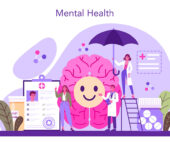Awareness of a mental health disorder is the cornerstone of effective management and healing. In a world where the stigma surrounding mental health persists, acknowledging and understanding one’s condition is the first crucial step towards well-being.
The power of awareness lies in its ability to dismantle the barriers of misunderstanding and stigma. When individuals recognize and accept their mental health challenges, it paves the way for open conversations and reduces the burden of shame. This self-awareness empowers individuals to seek help without fear of judgment, fostering a supportive environment for healing.
Moreover, awareness is the compass that guides individuals towards appropriate and timely interventions. Recognizing the symptoms and patterns associated with a mental health disorder enables proactive measures, such as seeking professional help, implementing self-care strategies, and building a support network. Early intervention often leads to more favorable outcomes, preventing the escalation of symptoms and improving overall prognosis.
Awareness is a catalyst for destigmatizing mental health within society. As individuals openly share their experiences, challenges, and triumphs, it contributes to a collective understanding of mental health disorders. This shared awareness reduces societal misconceptions and fosters empathy, creating a more inclusive and supportive community.
In the realm of self-management, awareness serves as a compass for navigating the complexities of mental health. It allows individuals to identify triggers, recognize early warning signs, and implement coping mechanisms tailored to their unique needs. This personalized approach to management enhances resilience and equips individuals with the tools to navigate the ebb and flow of their mental health journey.
The importance of awareness extends beyond the individual to encompass friends, family, and the broader community. A well-informed support system plays a pivotal role in the management of mental health disorders. When those around an individual are aware and understanding, it creates a nurturing environment that facilitates healing and recovery.
In conclusion, the awareness of a mental health disorder is not just a recognition of challenges but a beacon guiding the way to empowerment and resilience. By embracing awareness, individuals not only reclaim control over their mental health but also contribute to the collective effort of dismantling stigma and fostering a society that prioritizes mental well-being.





